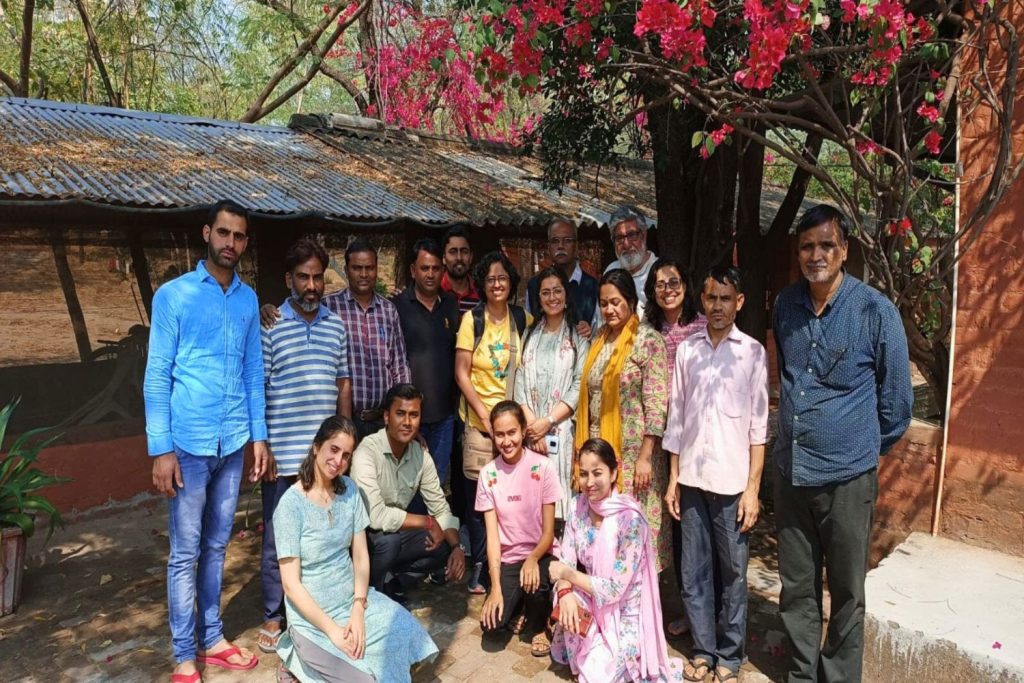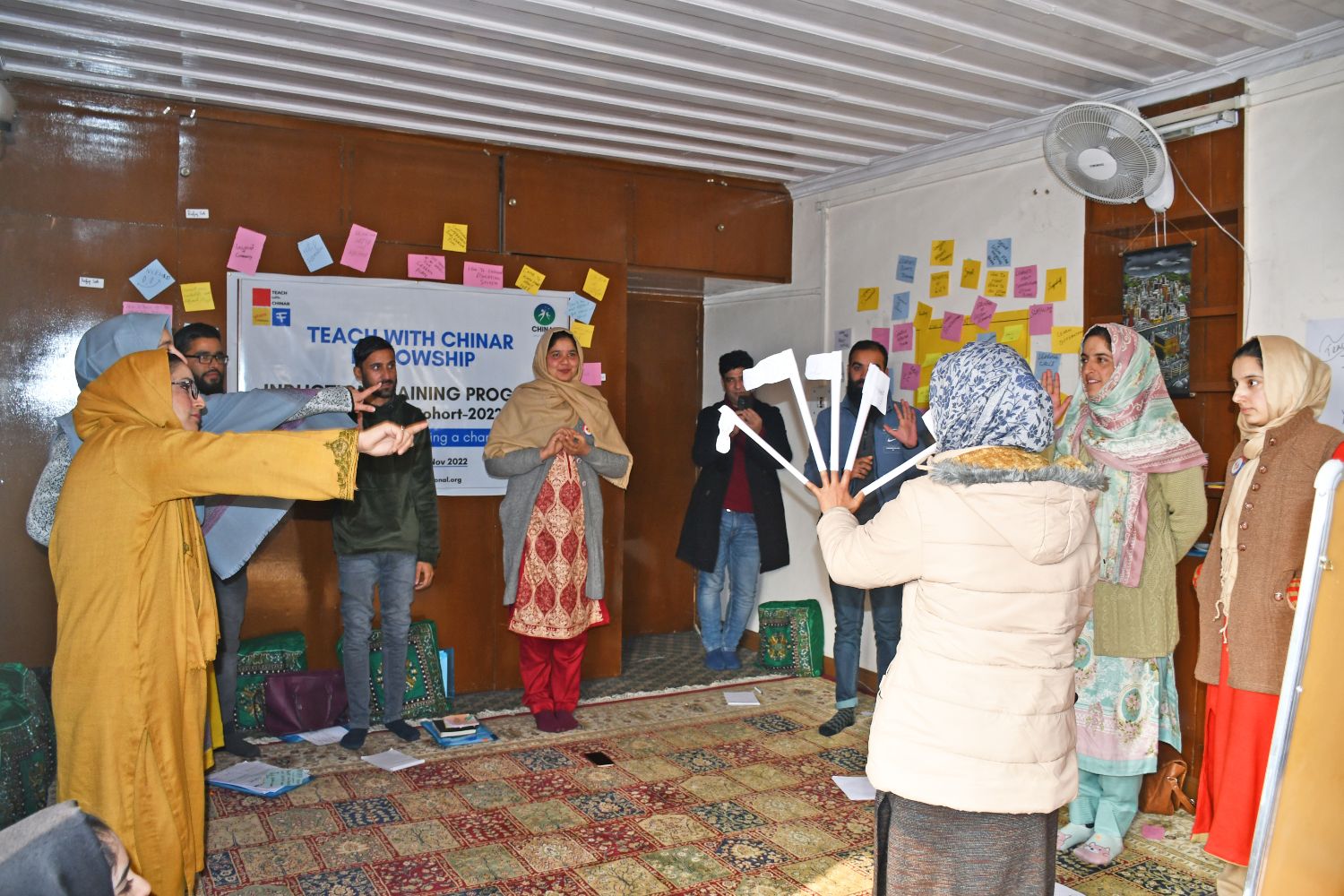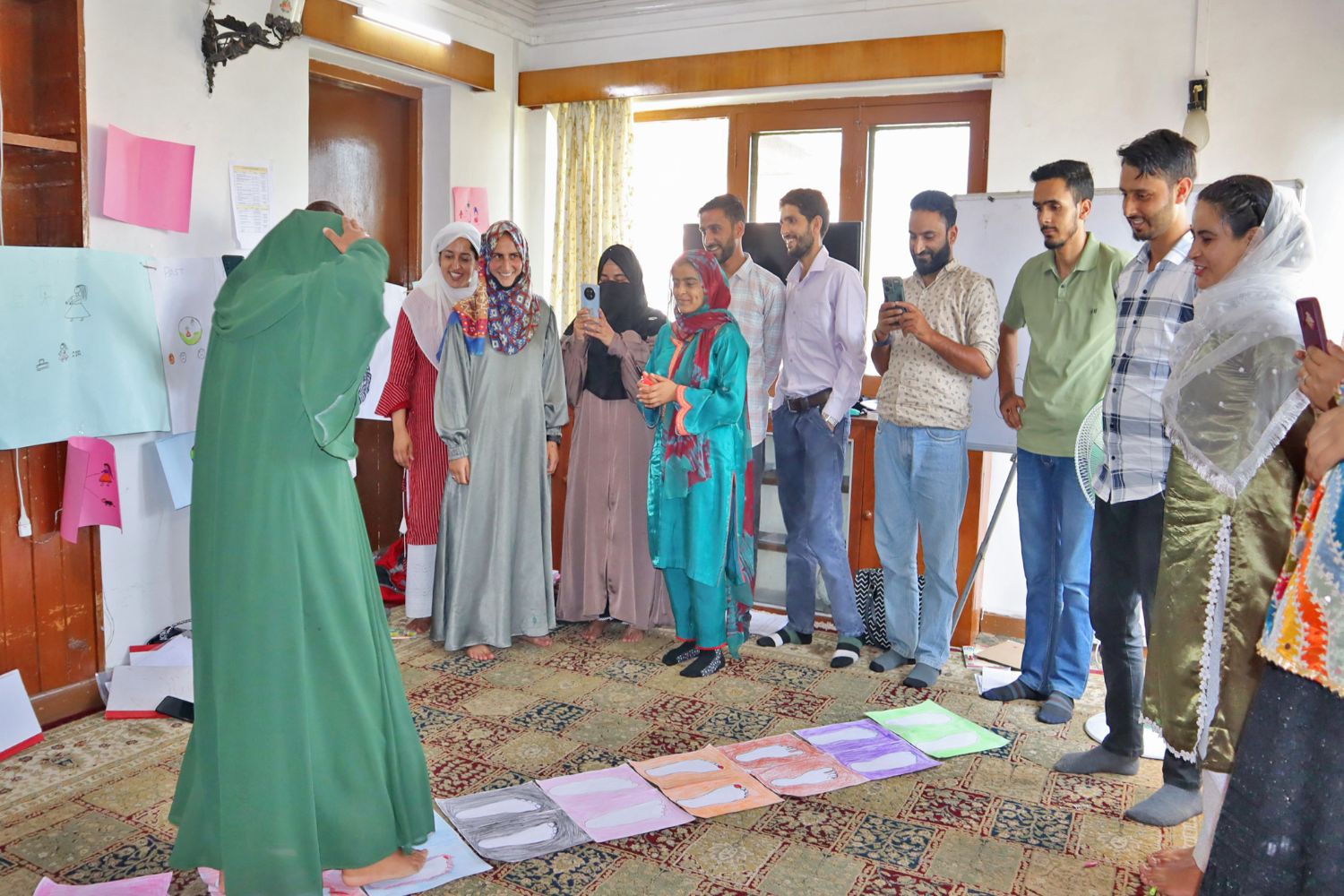Building capacities for transformative education: Mera Gaon Meri Dunia’s journey
Kamlesh, in his piece, shows how capacity building is such a critical component of building an inclusive and responsive organization, especially for a young CSO like theirs.

In February 2022, while discussing with our grassroots leaders, we realized that we needed to expand their horizons. They wanted opportunities for learning and exposure, where they could participate in the state of the art in the development space. Then onward, our capacity-building plans have focused on boosting the growth of our leaders.
At Mera Gaon Meri Dunia (MGMD), we have always believed in the transformative power of education, especially when it is deeply connected with the community it serves. Working in the rural areas of the Malwa region of Madhya Pradesh, our organization has witnessed firsthand the impact that capacity building (CB) can have on education, community engagement, and the growth of civil society organizations (CSOs) in general.
In this piece, we reflect on our capacity building journey. We focus on identifying our needs, and how our learnings have informed our practices on the ground. In the last three years, our organization has been part of multiple CB workshops by Digantar, Bookworm, LEC-Parag, Jodo Gyan, and OELP.
These workshops are intended to build the capacity of people working in different roles from grassroots to leadership to enhance overall mindset, skills, knowledge and understanding. Such organizational CB workshops have equipped us with pedagogical caliber. They have also helped us enhance our experiential knowledge for ground-readiness. These have broadened our horizons as well, and enabled team members to think and act systemically and rigorously.
For organizations like us, it becomes crucial to learn continuously while experimenting and practicing new methodologies in the arenas we work in. Building leaders who have a holistic sense of the purpose of the work and the work itself is the core intent we begin with. This is why nurturing the potential of people to grow at a steady process is our core focus.
About Mera Gaon Meri Dunia
Mera Gaon Meri Dunia (MGMD) is a registered NGO under the Section 8 of Companies Act. The organization focuses on youth development and education transformation in rural Madhya Pradesh. Its vision is to create a world where youth drive sustainable social change.
MGMD’s mission is to transform the education landscape through community-led efforts, particularly by nurturing platforms for youth to connect with themselves and their communities. The organization operates on core values of ownership, decentralization, excellence, personal growth, joy and collaboration.
MGMD believes that dedicated, invested youth can bring significant change to villages, supporting this belief with a strong foundation of community involvement. Since its inception in 2019, MGMD has impacted over 5,500 children, 850 youth, and 1,200 parents. The organization has also nurtured 20 youth education leaders and empowered 30+ women as Edu-preneurs.
It has been certified as a Great Place to Work. Its key projects include Sparsh, Skills on Wheels, Shrinkhalaa, Mission Malwa, and Aaina Dekho. Each of these initiatives has been designed to empower local communities, youth, and women through education, skill development, and civic initiatives.
Identifying capacity building needs and the team’s role
One of the first steps in our capacity-building journey has been a thorough reflection on the challenges and opportunities in our work. For instance, in 2022, we become part of various workshops to address specific gaps in our educational interventions.
Workshops like ‘Role of Libraries in Primary Education’ by Parag and ‘Foundations of Education’ by Digantar were very useful. These revealed reading habits and the need for educators to foster a more child-centered approach in classrooms. These workshops helped us build foundational knowledge.
The process of identifying CB needs involves regular discussions within the team. The grassroots leaders are hungry to learn and share insights from their interactions with the community. Feedback from local leaders and teachers plays a key role in adapting the content and focus of our learnings and their implementation efforts.
At MGMD, leadership is not just about directing the team. It involves empowering everyone to be a leader in their own right. Our leadership team believes in a collaborative capacity-building approach. This means that the larger framework for CB is developed by the core team. However, the inputs of grassroots leaders and our stakeholders are crucial in tailoring it to the needs of the community.
Selecting participants for capacity building
The selection of participants for capacity building initiatives is a carefully considered process at MGMD. For us, it is not just about who can attend. It is about who will benefit the most and how they will cascade the learning to others.
For example, in the ‘Role of Libraries in Primary Education’ workshop, we specifically sent a person who has worked in libraries. We hoped that they would experiment with the learnings of the course. This was envisaged to ensure that the knowledge gained would directly impact the students and peer leaders working in similar contexts.
In the recent workshops, our Sparsh Leaders are included. Their participation is vital. They represent the future leaders of our community. By equipping them with the right skills and knowledge, we help pave the way for long-term, sustainable change.
Growth in our leaders through capacity building
Our leaders have been helped to change themselves firsthand through various CB workshops. They have built an ability to be agile in the school’s working space with students and teachers. They show command over subject-specific pedagogical understanding and methodologies used to deliver the learning in different contexts.
Our leaders have been equipped with the educational mindset toward nurturing holistic educational spaces where they work, and a deeper understanding of how learning happens within a classroom or in a school space in general. Our youth leaders have been change-makers in the community. They have been involved in processes of transformation, both internal and external in terms of skills, mindsets, exposure and knowledge.
Their growth has been remarkable in the classrooms and school-level interactions. Their leadership has inspired others in the community to take a more active role in the education of their children. This has the potential of contributing to a larger cultural shift toward valuing education as a key to the future.
Integrating learnings into practice
Capacity building at MGMD is not a one-time event. After each workshop, we ensure that there is a debrief and reflection session. Here the participants share their experiences. For example, after the ‘Foundations of Education’ workshop, participants held a sharing meeting. Here they discussed their learnings. They also shared how these could be applied in their work with all the people who hail from the same context of work.

Voices from the field
“I came to know closely how children can learn math and language without fear and without getting bored. An example of this is combining words to create a picture, like using balloons, scissors, threads, etc. Also, I got to learn the why and the how of doing evaluations. It was a lot of fun learning all of this.” – Mary, a leader from the Sparsh Program, who completed the Khelghar Workshops in 2023.
“I found it very enjoyable and conducive to learning to interact with people from different communities. Through activities like group reading, discussion on the article, and reading with guided questions like – “What is the author saying in the article?” – helped me establish an understanding of deeper things like what are their assumptions. and what are the implications of these?” – Manisha, Sparsh Leader, after completing the ‘Foundations of Education’ course organized by Digantar in 2023.
These sharing-learning sessions often lead to practical action items. For instance, after the workshops by Jodo Gyan and OELP, leaders were committed to introducing a concrete approach to teaching math in their classrooms to foster a love for the subject. These small, incremental changes have had a profound impact on the learning environment in the schools we work with.
We try to ensure that the learnings from the capacity-building workshops are taken to the ground. While doing this, we also intend to ensure that CB leads to tangible changes in practice. This is perhaps the most challenging aspect of the entire process.
At MGMD, we provide ongoing support to workshop participants through regular follow-ups and mentorship. In the case of Sparsh Leaders, for example, they receive guidance and handholding afterward, as they implement what they have learned in the field.
Additionally, we organize periodic review meetings. Here participants discuss their challenges in applying their new knowledge. They work together to find solutions. This continuous feedback loop ensures that capacity building is not just about learning new concepts. It ends up embedding them into everyday practice.
Outcomes and reflections
The outcomes of our capacity-building efforts have been significant. For one, we have seen a noticeable improvement in the quality of education in the schools we work with. Youth leaders are confident and enriched. Teachers are more engaged. Students have become more active learners. There is a growing sense of community ownership in education. Moreover, our local youth leaders have emerged as strong advocates for education and community development.
I have experienced two capacity-building workshops which were focused on ‘libraries in primary education’ and on ‘foundational literacy approaches’. The amount and quality of learning I received was crucial.
In the Library Educator’s Course (LEC) hosted by Parag, I learnt about the importance of nurturing a reading culture. I also got a deep sense of the vital role books play in children’s early learning stages. The course emphasized how storytelling and literature contribute to children’s developmental process and, by extension, to the society.
We explored children’s literature. We learnt how to do an analysis of a library’s collection. We also gained practical skills in library management and assessment tools.
I also learned how to integrate literacy activities through library setups. This included using books as a pedagogy within the school system to enhance language learning and to foster a love for reading.

The course on ‘Foundational literacy approaches’ by OELP introduced innovative methodologies. It emphasized methods like integrating children’s worlds into the classroom, and creating print-rich environments for language learning. Observing OELP’s teachers, I saw rapid language development in students.
In this course, collaborating with peers on theories and practical ideas was highly enriching. The techniques used to create an engaging environment provided deep insights into promoting early literacy within just 5-6 days. The way they maintain student portfolios with formative assessments was an important thing to learn. This is a very useful tool to keep track of a child’s growth.
Concluding remarks
At Mera Gaon Meri Dunia, capacity building is an ongoing process. It informs every aspect of our work. As a process, it is focused on the needs of the community and on fostering local leadership. This helps to ensure that our learnings are integrated into practice.
We hope that through this, we can create meaningful and lasting change in the education sector. We believe that as CSOs, our role is not just to deliver services. It is to build the capacity of the communities we serve. We must empower them to take ownership of their development.
MGMD’s efforts are intended to widen the skillset of youth by enabling them to be able to perform various important skills. These include people management, communication, community interaction, facilitation, data analysis for effective planning and design, and having a systemic approach toward solving problems, etc.
We host internal and external workshops to equip our team with the advanced skills. We hope these will eventually help them in leading the organization in various areas like human capital, program design, fundraising and partnerships, communications, and project management, etc. The larger purpose is to have distributive leadership in the organization, where multiple people have the opportunity and the ability to lead the spaces and bear the flag of the change-process.
Our grassroots leaders are also part of organizational development domains as mentioned above. Here they gain experience with learning. They also get the exposure to interact with established CSOs on domain specific training and learning programs. Our skill-based CB processes are not limited to skills. They aim to nurture leaders who would be the torchbearers of the organization by leading it in multiple ways through their unique styles of leadership.




No approved comments yet. Be the first to comment!